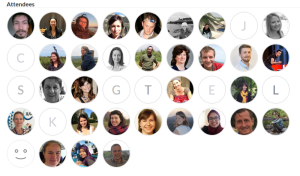 If you’ve been around social media in recent weeks and interested in nature conservation, you probably have come across the Conservation Optimism Summit (held in London, 20–22 April 2017). There has been a lot of excitement and positivism. This, however hasn’t prevented the organizers from shedding some light also on the more uncomfortable side of our relation to nature: when we’re exploiting inature to fulfill our hunger for resources and goods. Entitled “The future of corporate biodiversity accounting and disclosure” the session chaired by Prue Addison from the Interdisciplinary Centre for Conservation Science at the University of Oxford set the focus on business and biodiversity. More information on the outline as well as the attendees can be found below. To engage in the wieder discussion check also on the website of the Conservation Optimism Summit or follow the hashtag #ConservationOptimism.
If you’ve been around social media in recent weeks and interested in nature conservation, you probably have come across the Conservation Optimism Summit (held in London, 20–22 April 2017). There has been a lot of excitement and positivism. This, however hasn’t prevented the organizers from shedding some light also on the more uncomfortable side of our relation to nature: when we’re exploiting inature to fulfill our hunger for resources and goods. Entitled “The future of corporate biodiversity accounting and disclosure” the session chaired by Prue Addison from the Interdisciplinary Centre for Conservation Science at the University of Oxford set the focus on business and biodiversity. More information on the outline as well as the attendees can be found below. To engage in the wieder discussion check also on the website of the Conservation Optimism Summit or follow the hashtag #ConservationOptimism.
Session description
This session aims to provide a platform to share the latest research and best practice examples of business’ involvement in biodiversity conservation. This session will focus specifically on biodiversity accounting (e.g., the development of biodiversity metrics for business) and disclosure (e.g., reporting on biodiversity impacts in corporate social responsibility reports and financial reports), as many UK based businesses, academics and NGOs are undertaking world-leading work in this area.
This session will be structured as an interactive panel discussion and Q&A event. We will firstly focus on some of the positive steps businesses are currently taking to account for biodiversity in their business, and some of the scientific advances helping businesses do this. Panelist will then answer some more challenging and forward thinking questions about where businesses should be going for corporate biodiversity accounting and disclosure; and importantly what steps they can take to go above and beyond mitigating their impacts to contribute to the conservation of biodiversity.
At this session you will be joined by business, NGO, and academic representatives who are undertaking world-leading work on corporate biodiversity accounting and disclosure. Our session will provide a platform to network with your peers, share current ideas and best-practice, and debate the future direction of corporate biodiversity accounting and disclosure. This session finally aims to ensure a strong and positive message from the corporate sector will be a part of the broader Conservation Optimism summit dialogue.
This session is proudly sponsored by the Natural Environment Research Council, the UK’s largest funder of independent environmental science, training and innovation.
Session panelists
Prue Addison, Knowledge Exchange Fellow and Postdoctoral Researcher, Interdisciplinary Centre for Conservation Science, University of Oxford
Julia Baker, Biodiversity Technical Specialist, Balfour Beatty
Richard Barker, Professor of Accounting, Saïd Business School, University of Oxford
Giulia Carbone, Deputy Director, IUCN Global Business and Biodiversity Programme
Helen Crowley, Head of Sustainable Sourcing Innovation, Kering
Chris Eves, Foresty Officer, Zoological Society of London
Clément Feger, Postdoctoral researcher, University of Cambridge Conservation Research Institute and Luc Hoffmann Institute
Martina di Fonzo, Postdoctoral researcher, Cambridge Institute for Sustainability Leadership, University of Camrbidge Conservation Research Institute
Mark Gough, Executive Director, Natural Capital Coalition
Pippa Howard, Programme Director, Corporate Partnerships, Fauna & Flora International
Keith Tuffley, CEO of The B Team
Bhaskar Vira, Founding Director of the University of Cambridge Conservation Research Institute
Francis Vorhies, Executive Director, Earthmind
